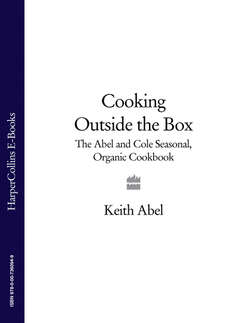Читать книгу Cooking Outside the Box: The Abel and Cole Seasonal, Organic Cookbook - Keith Abel - Страница 6
A brief ethical guide to help you enjoy your fruit and vegetables…and meat!
ОглавлениеChristmas is currently celebrated once a year, but I’m quite sure that if the people who run most of Britain’s food shops had the chance, they’d be lobbying to see if perhaps there could be a second official Christmas in June as well, or maybe even once a month. And if this plan were to go ahead, would we enjoy the whole thing as much? Well, the first year might be rather novel but I’m sure that after a few years, Christmas would lose its magic.
This is exactly what has happened with our food. Now that you can buy strawberries in January and “new season” lamb all year round, many people just don’t know what’s in season any more, or that food eaten in its proper season actually tastes better. The most common question I’m asked by fruit ‘n’ veg junkies is, “so, what is in season?” As I’ve tried to show in this book, each season has loads of treats to offer. Not only is that how and when nature intended them to be eaten, but they won’t be forced up out of the ground synthetically or duped into thinking it’s another time of year with costly heating that causes all sorts of environmental havoc. Most importantly of all, by eating seasonally you are able to enjoy things shortly after they are harvested, and as anyone who has ever had a vegetable patch or allotment can tell you, food flavour and time out of the ground are directly related.
Finally, a real bugbear of mine is the method by which this out-of-season produce gets onto the supermarket shelves: airfreight. A common misconception is that all produce from abroad is airfreighted, and this is not the case. It simply doesn’t make business sense for the supermarkets to airfreight apples which can be grown locally and stored for use, or bananas which can be sent by ship and then ripened on arrival in our ports. What is therefore likely to be sent by airfreight is produce that is expensive, light, delicate – and from far away, obviously. Look at the labels in the supermarket – if out of season, your asparagus is likely to be from Peru, your prepared French beans from Guatemala, and your baby sweetcorn from Thailand.
There is one great big caveat to bear in mind, and it’s an important one to remember before you start to think this is all too daunting: there is no need to be puritanical about eating seasonally. Just as the odd pint at lunchtime doesn’t make me an alcoholic, so feeding my children bananas or tomatoes all year round (and heaven knows it’s difficult to cope without tomatoes all year round) doesn’t make me either a bad parent or an ecological outcast. The message is just that if you make a point of becoming aware of what’s best when and how it was grown, you’ll not only enjoy the flavour more, but over time the scales will tilt in the right direction for the environment, your health, and the welfare of the people who grow your food.
